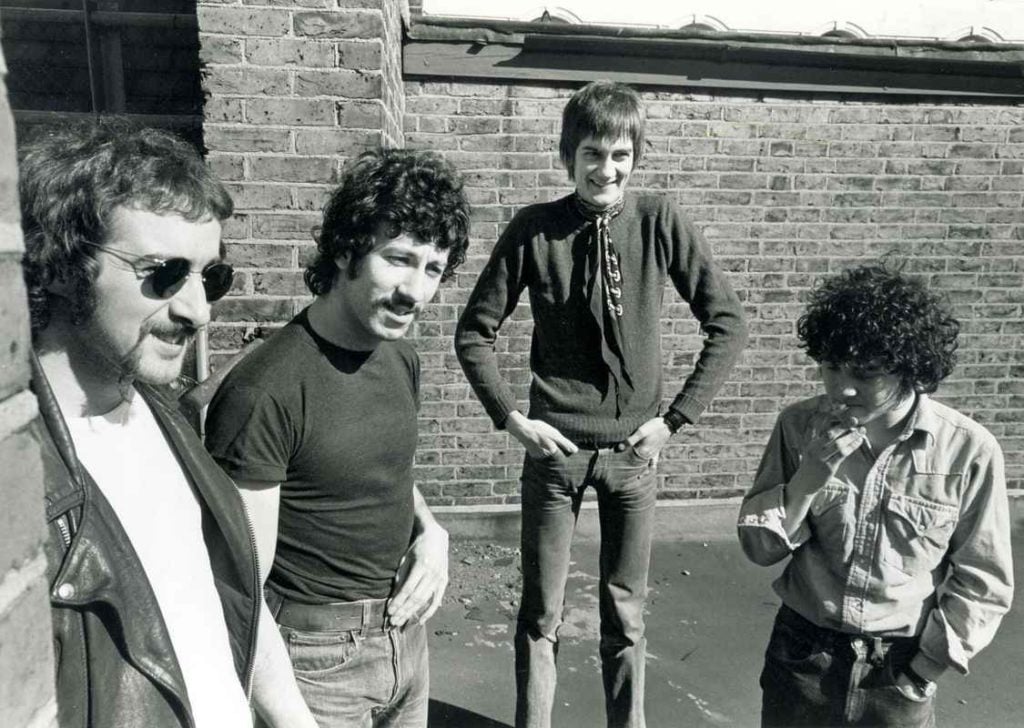Why Did Peter Green Depart Fleetwood Mac Before Their Rise To Fame?

Table of Contents
The Genesis of Peter Green's Fleetwood Mac and Early Success
Peter Green's Fleetwood Mac, formed in 1967, wasn't just another blues-rock band; it was a crucible of innovation. Green, a supremely talented guitarist with a unique vibrato and phrasing, spearheaded the group's early success. His songwriting prowess and musical vision defined their distinctive sound. The band's origins are deeply rooted in the vibrant blues scene of the British Invasion era.
-
Formation and Early Lineup: The initial lineup featured Peter Green on guitar and vocals, Jeremy Spencer on guitar and vocals, Mick Fleetwood on drums, and John McVie on bass. This core lineup would define the band's early sound.
-
Innovative Blues-Rock: Fleetwood Mac quickly established themselves with their innovative take on blues-rock. They infused traditional blues structures with a psychedelic edge, creating a unique and captivating sound that resonated with audiences.
-
Early Albums and Hits: Albums like Fleetwood Mac (1968) and Then Play On (1969) showcased Green's songwriting brilliance. Hit singles such as "Albatross," a hauntingly beautiful instrumental, and "Black Magic Woman," a blues-rock staple, propelled them to prominence, establishing them as major players in the British music scene.
-
Green's Musical Genius: Peter Green's guitar playing was revolutionary. His fluid style, unique vibrato, and ability to effortlessly blend blues with other genres distinguished him as a virtuoso and a highly influential musician.
The Impact of Psychedelic Drugs and Mental Health
The 1960s music scene was heavily influenced by the use of psychedelic drugs. While not the sole factor, the pervasive use of these substances played a significant role in Peter Green's eventual departure. The pressures of fame and the constant touring schedule likely exacerbated any pre-existing vulnerabilities.
-
Psychedelic Drug Use in the 60s: The prevalence of LSD and other hallucinogens among musicians of the era is well-documented. It’s believed Green’s experimentation with these substances significantly impacted his mental state.
-
Onset of Schizophrenia: Over time, Green exhibited symptoms consistent with schizophrenia, a debilitating mental illness characterized by hallucinations, delusions, and disorganized thinking. These symptoms drastically altered his behavior and decision-making abilities.
-
Drug Use as a Contributing Factor: Though not conclusively proven, many believe that Green's experimentation with psychedelic drugs contributed to the deterioration of his mental health, leading to the manifestation of his schizophrenia symptoms.
-
Lack of Mental Health Support: The understanding and treatment of mental illness were far less advanced in the 1960s. The lack of readily available support systems for musicians struggling with mental health issues is a crucial aspect of understanding Green's situation.
Creative Differences and Conflicts Within the Band
While his mental health played a dominant role, internal conflicts within the band also contributed to Peter Green's departure. Tensions surrounding creative control and musical direction likely intensified as the band's success grew.
-
Musical Direction: Differing opinions on the band's musical direction may have emerged as Green’s mental health declined. The band's evolution and experimentation may not have always aligned with Green’s original vision.
-
Songwriting Credits and Leadership: Disputes over songwriting credits and band leadership could have added to the internal friction. The creative process within the band may have become increasingly strained.
-
Growing Tensions: While specifics are scarce, anecdotes suggest growing tensions between Green and other band members, contributing to an increasingly toxic environment that ultimately led to his exit.
The Aftermath: Peter Green's Departure and Fleetwood Mac's Transformation
Peter Green's departure in 1970 left a void in Fleetwood Mac. His absence marked a profound turning point, setting the stage for a significant transformation in the band's lineup and musical direction.
-
Immediate Impact: The band struggled initially following Green's departure. His unique musical contributions and leadership were irreplaceable.
-
Lineup Changes and the Rise of Buckingham Nicks: The subsequent addition of Lindsey Buckingham and Stevie Nicks drastically altered the band's trajectory, leading to a more pop-oriented sound.
-
Evolution of Musical Style: The post-Green era Fleetwood Mac showcased a significant shift in musical style. While still drawing from blues influences, the band incorporated elements of pop and soft rock.
-
Contrasting Success: The band's later success, achieving global superstardom, stands in stark contrast to their earlier, more blues-rock focused era. However, this success wouldn't have been possible without Green's foundational contributions.
-
Green's Enduring Influence: Despite his departure, Peter Green’s influence on Fleetwood Mac remains indelible. His legacy as a founding member and a highly influential guitarist continues to shape the band's identity.
Conclusion
Peter Green's departure from Fleetwood Mac was a complex event stemming from a confluence of factors, including the intense pressures of the music industry, the devastating impact of psychedelic drugs on his mental health, and potential creative differences within the band. His contributions to the band's early sound are undeniable, and his legacy continues to inspire musicians today. While his departure marked a significant turning point, it also paved the way for Fleetwood Mac's later, massively successful era. Understanding the reasons behind Peter Green's departure provides crucial insight into the band's history and the challenges faced by artists in the music industry. Learn more about this fascinating period in rock history by further exploring the life and career of this influential blues legend and the early years of Fleetwood Mac.

Featured Posts
-
 Makron Ukraina I Alzhir Riski Dlya Frantsii
May 05, 2025
Makron Ukraina I Alzhir Riski Dlya Frantsii
May 05, 2025 -
 Kentucky Derby 2025 Where To Find The Best Odds And Place Your Bets
May 05, 2025
Kentucky Derby 2025 Where To Find The Best Odds And Place Your Bets
May 05, 2025 -
 Honjo Restaurant Review A Modern Japanese Dining Experience In Sheung Wan Hong Kong
May 05, 2025
Honjo Restaurant Review A Modern Japanese Dining Experience In Sheung Wan Hong Kong
May 05, 2025 -
 Predicting The Marina Rodriguez Vs Gillian Robertson Fight At Ufc Iowa
May 05, 2025
Predicting The Marina Rodriguez Vs Gillian Robertson Fight At Ufc Iowa
May 05, 2025 -
 Georgetowns Derby Queen A Celebration Of Kentucky Spirit
May 05, 2025
Georgetowns Derby Queen A Celebration Of Kentucky Spirit
May 05, 2025
